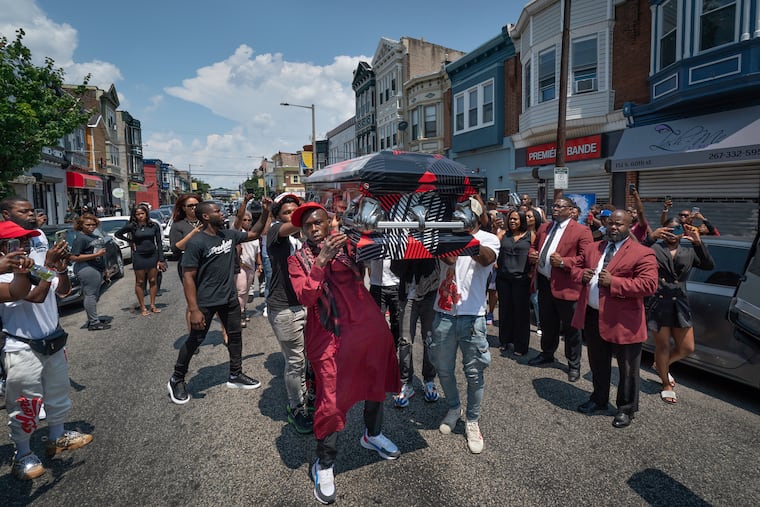An Inquirer series on gun violence has been named a Pulitzer finalist; Philly playwright wins
In its citation, the Pulitzer board wrote called the series “richly reported” and noted its “compelling writing and photography."

The Inquirer’s 2021 series on gun violence in Philadelphia, “Under Fire,” was named a finalist for a Pulitzer Prize in explanatory reporting on Monday. And Philadelphia playwright James Ijames was awarded best play for Fat Ham, a loose adaptation of Hamlet set at a Black family’s barbecue in the South.
In its citation, the Pulitzer board called the Inquirer series “richly reported” and noted its “compelling writing and photography” that “tackled the complex roots of gun violence in the city, centering on the people and communities most affected by it.”
Under Fire was one of 108 submissions to the explanatory journalism category — and one of just three finalists that a panel of seven journalists recommended, without rankings, to the Pulitzer Board, which chooses a winner from among the three. The top prize went to the staff of Quanta Magazine and its senior editor Natalie Wolchover for reporting on the James Webb Space Telescope.
Under Fire launched in 2020 and was shepherded into print by a team of reporters, photographers and editors, including Chris Palmer, Dylan Purcell, Jessica Griffin, Mensah M. Dean, Anna Orso, Mike Newall, James Neff, Nancy Phillips, and Daniel Rubin.
» READ MORE: The Inquirer's 'Under Fire' series
Stories in the series ranged from a breakdown of how gun violence is concentrated in just a few neighborhoods in Philadelphia to an examination of conviction rates in shooting cases and to a deep dive into why many young men in the city feel the need to carry guns. The series also looked at individual cases that served as windows into the larger crisis in Philadelphia: a pair of best friends killed over a feud they weren’t even involved in; and a North Philadelphia man who survived being shot eight times.
James Neff, the Inquirer’s investigations editor, said the reporters involved wanted to assure subjects that they were “there for the long haul,” committed to telling stories about the impact of gun violence deeper than daily crime reporting.
“People are not only thrilled at the recognition, but we’re pleased that the seven judges who screened it really recognized what they were trying to do with the story — the uniqueness, the difficulty, and the care that went into it,” Neff said.
In particular, he said, the article “Intersections of Injustice,” which identified 57 blocks in the city that have seen 10 or more shootings since 2015, is “driving engagement by the District Attorney’s office and City Hall, and we’ve shared the data with the public, academics, whoever wants to access our first-of-its-kind analysis.”
A number of Philadelphia natives and stories that focused on Philadelphia-area people also garnered Pulitzers this year. Ijames, who won best play for Fat Ham, is an assistant theater professor at Villanova University and a lead artistic director at the Wilma Theater.
“It means so much — I’m a kid from a small town in North Carolina, and I had these dreams of writing things that people would want to connect with,” Ijames said. “It’s a real culmination of a lot of work, sweat, and tears — a lot of tears.”
Because of the COVID-19 pandemic, the Wilma ended up filming Fat Ham, since it couldn’t be performed in person. Later this week, it will open at the Public Theater in New York.
“The play is a very loose adaptation of Hamlet, but at the core it’s exploring how families decide to end their cycles of trauma or abuse, and transform that into joy, and abundance. This family, loosely based on the court of Denmark, is exploring that for themselves,” Ijames said. “It’s very funny, very touching, and very southern.”
Ijames, who’s lived in Philadelphia for nearly 20 years, since he began grad school at Temple University, says his experiences in the theater scene here — from experimental plays to more straightforward productions — have shaped his own writing. “A lot of the reason I stayed is because … I got to do a lot of different theater in Philadelphia. My education of what theater would be was really broad. It made me want to write in a way that would extend theatricality — where actors would push themselves physically or vocally, thinking about what a play could be,” he said.
Several other Pulitzer winners also have Philadelphia connections.
The podcast Suave, from Futuro Media and PRX, won best audio reporting; it focuses on a North Philadelphia man, Luis “Suave” Gonzales, who was sentenced to life in prison for murder at 17. Gonzales was released in 2017, and the podcast chronicles his adjustment to the outside world after decades locked up.
Gonzales now works at the Community College of Philadelphia; he’s a support coach in a program aimed at helping formerly incarcerated people and their family members get a college education, Inquirer columnist Helen Ubiñas reported earlier this year.
The Atlantic’s Jennifer Senior won the prize for feature writing for a piece on a Bucks County man killed in the Sept. 11 attacks.
Joshua Cohen, who grew up in Atlantic City, won the prize for fiction writing for his novel The Netanyahus, a fictionalized account of a trip that the former Israeli prime minister’s family took to Cornell University in the 1960s.
Nicole Eustace won one of two prizes for history writing, for her book Covered With Night, on the 1722 murder of an Indigenous man from Conestoga, Chester County, and the long legacy of the criminal investigation that followed.